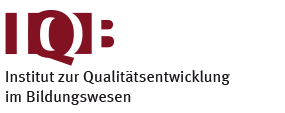Trends in International Mathematics and Science Study 2007 (TIMSS 2007)

Inhaltsverzeichnis
> Scientific Use Files beantragen
| Datensatz veröffentlicht am | 01.07.2013 |
|---|---|
| aktuelle Version verfügbar seit | 01.07.2013 |
| Erhebungszeitraum | 2007 |
| Stichprobe | Schüler*innen der Jahrgangsstufe 4 (N=5.200) an allgemeinbildenden Schulen (N=246); Klassen (N=246); Lehrkräfte (N=373) |
| Erhebungseinheit | Eltern Lehrkräfte Schüler*innen Schulleitung |
| erfasste Kompetenzen | Mathematik, Naturwissenschaften |
| Region | deutschlandweit, Baden-Württemberg, Bayern, Berlin, Brandenburg, Bremen, Hamburg, Hessen, Mecklenburg-Vorpommern, Niedersachsen, Nordrhein-Westfalen, Rheinland-Pfalz, Saarland, Sachsen, Sachsen-Anhalt, Schleswig-Holstein, Thüringen |
| Leitung | Bos, Prof. Dr. Wilfried |
| Datengebende | Kultusministerkonferenz (KMK) |
| Auftraggebende / Mittelgebende | Bundesministerium für Bildung und Forschung (BMBF), Kultusministerkonferenz (KMK) |
| Link zur Studie | Internationale Website: https://www.iea.nl/studies/iea/timss/2007 Nationale Website: https://www.forschungsdaten-bildung.de/studien/275-timss-trends-in-international-mathematics-and-science-study-2007/?cHash=d1d2178b673acef2f7fc71744ee108a4 |
| Verwandte Studien | TIMSS 2011 (DOI: 10.5159/IQB_TIMSS_2011_v1), TIMSS 2015 (DOI: 10.5159/IQB_TIMSS_2015_v2), TIMSS 2019 (DOI: 10.5159/IQB_TIMSS_2019_v3) |
| Zitationsvorschlag | Bos, W., Bonsen, M., Baumert, J., Prenzel, M., Selter, C. & Walther, G. (2013). Trends in International Mathematics and Science Study 2007 (TIMSS 2007) (Version 1) [Datensatz]. Berlin: IQB – Institut zur Qualitätsentwicklung im Bildungswesen. http://doi.org/10.5159/IQB_TIMSS2007_v1 |
| Datenrestriktion / Zugangshinweise | Für diese Studie liegt keine Bundesland-Variable vor. Kognitive Grundfähigkeiten dürfen nicht als abhängige Variable in den Analysen verwendet werden. |
Projektbeschreibung
TIMSS 2007 ist eine internationale Schulleistungsstudie der International Association for the Evaluation of Educational Achievement (IEA). Im Rahmen der Studie wurden die mathematischen und naturwissenschaftlichen Kompetenzen von Grundschüler*innen der vierten Jahrgangsstufe erfasst. Neben den Leistungsdaten stehen Kontextbefragungen der Schüler*innen, der Lehrkräfte und der Schulleitungen zur Verfügung. Dadurch können die erreichten Kompetenzen in Beziehung zu Schüler*inneneigenschaften und Merkmalen auf Schul- und Unterrichtsebene gesetzt werden. Eine Besonderheit von TIMSS besteht in der Anwendung eines Curriculum-Modells, das bei der Auswahl der Testaufgaben zum Einsatz kam. Im Rahmen des Modells wird das intendierte Curriculum eines Landes durch Expert*innenbefragungen erfasst und anschließend mit dem implementierten Curriculum (Schulleitungs- und Lehrkräftebefragungen) und dem erreichten Curriculum (Leistungstests, Schüler*innenbefragung) verglichen. Dadurch sollen präzisere Aussagen über den Einfluss schulischer Rahmenbedingungen auf die Leistungsentwicklung ermöglicht werden. Die nationale Erhebung von TIMSS 2007 wurde hauptverantwortlich vom Institut für Schulentwicklungsforschung (IFS) in Dortmund durchgeführt und ausgewertet. (Projekt/IQB)
Leerdatensätze
Um Ihnen einen ersten Überblick der Datensätze zu vermitteln, haben Sie hier die Möglichkeit, Leerdatensätze herunterzuladen.
Dokumentation
Hier finden Sie weiterführendes Material zur Studie:
Weiterführende Informationen
Weitere Informationen zu TIMSS 2007 (in englischer Sprache) finden sich auch auf den Webseiten der IEA und des TIMSS & PIRLS International Study Center.
Literatur
Eine Auswahl an Publikationen finden Sie in dieser  Literaturliste (Stand 25.05.2021).
Literaturliste (Stand 25.05.2021).
2021
Tahirsylaj, A. & Werler, T. C. (2021). In Search of Dimensions of Bildung: A Quantitative Approach. Nordic Studies in Education, 41(1), 1–23. https://doi.org/10.23865/nse.v41.2130
2019
Guill, K. & Lintorf, K. (2019). Private tutoring when stakes are high: Insights from the transition from primary to secondary school in Germany. International Journal of Educational Development, 65, 172–182. https://doi.org/10.1016/j.ijedudev.2018.08.001
2018
Autorengruppe Bildungsberichterstattung. (2018). Bildung in Deutschland 2018. Ein indikatorengestützter Bericht mit einer Analyse zu Bildung und Migration [Education in Germany 2018. An indicator-based report including an analysis of education and migration]. Bielefeld: wbv. https://doi.org/10.3278/6001820fw
Schult, J. & Sparfeldt, J. R. (2018). Reliability and Validity of PIRLS and TIMSS. European Journal of Psychological Assessment, 34(4), 258–269. https://doi.org/10.1027/1015-5759/a000338
2016
Autorengruppe Bildungsberichterstattung. (2016). Bildung in Deutschland 2016. Ein indikatorengestützter Bericht mit einer Analyse zu Bildung und Migration [Education in Germany 2016. An indicator-based report including an analysis of education and migration]. Bielefeld: Bertelsmann. https://doi.org/10.3278/6001820ew
2015
Porsch, R. (2015). Unterscheiden sich Mathematiklehrkräfte an Grundschulen mit und ohne Fach-Lehrbefähigung hinsichtlich ihrer berufsbezogenen Überzeugungen? Ergebnisse aus TIMSS 2007. Mathematica didactica, 38, 5–36. Verfügbar unter http://www.mathematica-didactica.com/altejahrgaenge/md_2015/md_2015_Porsch_Mathematiklehrkraefte.pdf
Walzebug, A. (2015). Sprachlich bedingte soziale Ungleichheit. Theoretische und empirische Betrachtungen am Beispiel mathematischer Testaufgaben und ihrer Bearbeitung. Münster: Waxmann.
2013
Bos, W., Bonsen, M., Baumert, J., Prenzel, M., Selter, C. & Walther, G. (2013). Trends in International Mathematics and Science Study 2007 (TIMSS 2007) (Version 1) [Datensatz]. Berlin: IQB - Institut zur Qualitätsentwicklung im Bildungswesen. https://doi.org/10.5159/IQB_TIMSS2007_v1
Frey, A. (2013). Soziale Kompetenz. Eine Fragebogenerfassung in der Grundschule. Münster: Waxmann.
Schmitz, S., Tarelli, I., Wendt, H. & Bos, W. (2013). Bildungschancen von Kindern alleinerziehender Eltern. In H. Bertram & K. Konrath (Hrsg.), Reiche, kluge, glückliche Kinder? Der UNICEF-Bericht zur Lage der Kinder in Deutschland (S. 118–133). Weinheim: Beltz Juventa.
Wendt, H., Euen, B. & Bos, W. (2013). TIMSS 2007 Nutzermanual. Dokumentation zur Arbeit mit den Datensätzen von TIMSS 2007 [TIMSS 2007 user manual. Documentation regarding the handling with data sets of TIMSS 2007]. Verfügbar unter https://www.iqb.hu-berlin.de/fdz/studies/TIMSS2007/TIMSS2007_Manual.pdf
2012
Lintorf, K. (2012). Wie vorhersagbar sind Grundschulnoten? Prädiktionskraft individueller und kontextspezifischer Merkmale. Wiesbaden: Springer VS. https://doi.org/10.1007/978-3-531-94339-8
2010
Bos, W., Stubbe, T. C. & Buddeberg, M. (2010). Gibt es eine armutsbedingte Bildungsbenachteiligung? Die Operationalisierung verschiedener Indikatoren der sozialen Herkunft von Schülerinnen und Schülern in der empirischen Bildungsforschung. In D. H. Rost (Hrsg.), Intelligenz, Hochbegabung, Vorschulerziehung, Bildungsbenachteiligung. [Fachtagung zum zehnjährigen Bestehen der "Begabungsdiagnostischen Beratungsstelle BRAIN"] (S. 165–208). Münster: Waxmann.
2009
Bos, W., Bonsen, M., Kummer, N., Lintorf, K. & Frey, K. (Hrsg.). (2009). TIMSS 2007. Dokumentation der Erhebungsinstrumente zur "Trends in International Mathematics and Science Study". Münster: Waxmann. Verfügbar unter http://nbn-resolving.de/urn:nbn:de:0111-pedocs-156654
Granzer, D. & Bonsen, M. (2009). Gute Nachrichten von TIMSS - Mathematische und naturwissenschaftliche Leistungen im weltweiten Vergleich. Grundschule, 41(6), 6.
Walther, G. & Bonsen, M. (2009). Hinter die Zahlen geschaut - Zentrale Ergebnisse aus TIMSS: die mathematischen Kompetenzen von Viertklässlern. Grundschule, 41(6), 18.
2008
Bonsen, M., Bos, W. & Frey, A. (2008). Germany. In I. V. S. Mullis, M. O. Martin, J. F. Olsen, D. R. Berger, D. Milne & G. M. Stanco (Hrsg.), TIMSS 2007 Encyclopedia. A guide to mathematics and science education around the world (S. 203–216). Chestnut Hill (MA): TIMSS & PIRLS International Study Center.
Bos, W., Bonsen, M., Baumert, J., Prenzel, M., Selter, C. & Walther, G. (Hrsg.). (2008). TIMSS 2007. Mathematische und naturwissenschaftliche Kompetenzen von Grundschulkindern in Deutschland im internationalen Vergleich. Münster: Waxmann.
Mullis, I. V. S., Martin, M. O., Olsen, J. F., Berger, D. R., Milne, D. & Stanco, G. M. (Hrsg.). (2008). TIMSS 2007 Encyclopedia. A guide to mathematics and science education around the world. Chestnut Hill (MA): TIMSS & PIRLS International Study Center.

